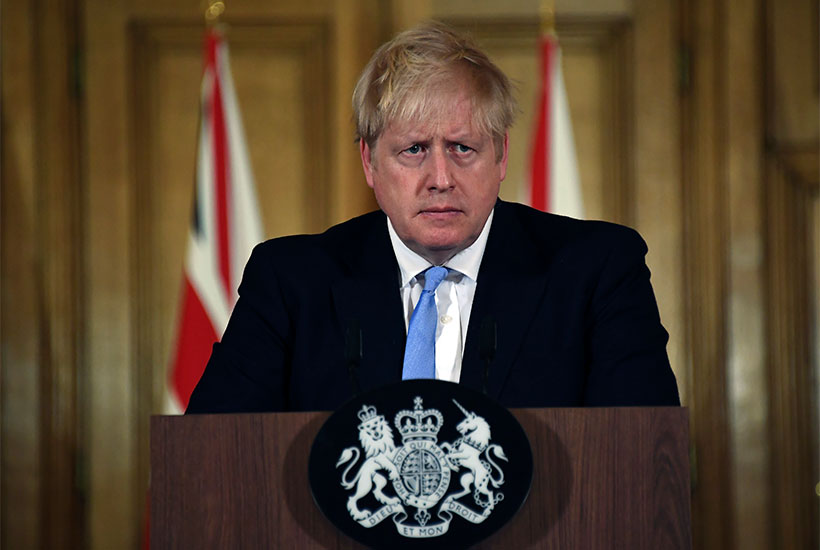It’s always tempting for governments to respond to economic trouble with a debt-fuelled spending splurge, but it’s a notoriously blunt tool. The root of the current problem is not financial panic but a rational response to the coronavirus. People are travelling less, staying away from shops and the workplace, delaying various projects, and they will keep doing so while the uncertainty remains. This disruption is painful but temporary. It is not symptomatic of financial malaise. It would be a mistake for the Conservatives to use this as a pretext to abandon their five-year plan to control the public finances.
The £30 billion stimulus to address jitters over coronavirus was quite a figure, especially as the extent of the economic impact of Covid-19 is far from clear. The size of the sum (and Bank of England response) suggests that the Treasury thinks Britain might be in far more economic trouble than the figures suggest – and that this government is very willing to spend its way out of tight spots. This was not an average Budget. Add everything up and it was the biggest giveaway since Norman Lamont’s pre-election Budget of 1992.
Look at the spending pledges: £200 million for life sciences, £300 million for clean air, £900 million for nuclear fusion, space and electric cars, £1 billion for green energy, £5 billion of government loans for businesses, £110 billion for capital budgets (a sum that has now trebled), £600 billion for infrastructure over five years. It’s the kind of spending list that would make Jeremy Corbyn blanch.
This is not an economy crying out for a massive stimulus
The tax cuts — in National Insurance and business tax relief — were in line with what Boris Johnson promised when he stood for election a few months ago. But he also promised fiscal responsibility, and we heard a lot less about that in this Budget. The manifesto promised to fund infrastructure, fill potholes and refurbish further education campuses. But this would be done responsibly, the Tories said: crucially, by the end of the parliament, the national debt would be lower than it is now. This was not an idle remark, but a manifesto pledge.
That pledge did not feature in Rishi Sunak’s Budget speech. Instead, he referred to a ‘live global debate’ about how much governments should borrow, and said he was going to make up his own mind. It’s likely that this will end in a new rule which will allow the government to borrow a lot more. This is the gamble within the budget.
The problem with borrowing more when there is no genuine financial crisis is that you run out of ammunition when a real crisis arises. Andy Haldane, chief economist at the Bank of England, has been pointing out for years that Britain is overdue a crash, having seen a decade of growth. Before the coronavirus struck, the UK had the lowest unemployment rates in 46 years and the strongest economic growth of any European member of the G7. This was not an economy crying out for a debt-fuelled stimulus.
It may well be that the oil price war and general market turmoil will become a global economic downturn. The economy (which did not grow in January) might be already in the sort of trouble that would necessitate a splurge of this historic size. The Bank of England has spent years stress-testing banks to make sure they have enough capital for a crisis: these systems should work now, without the need for the government to splash out. Bank rates were already near a 400-year low; cutting them further is unlikely to feed through to the real economy. Boris Johnson’s economic plan involves striking amounts of faith in the ability of government to spend wisely. His government intends to take more from the economy, in terms of tax as a share of GDP, than any time since 1984. When it comes to belief in small government and spending restraint, Thatcherism has left the body of the Tory party.
Plenty of dangers remain on the horizon: a no-deal Brexit, another trade war or another recession. Mr Sunak was right to say that the legacy from his Tory predecessors was a strong economy. He also inherited sensible rules on the national debt. With so much uncertainty ahead, sticking to such rules is more necessary than ever.
Biden, seriously?
The requirements to be President of the United States are few. A candidate must be born in the United States, to have lived there for at least 14 years, to be at least 35 years of age and never to have worked to overthrow the US state. He or she does not have to belong to the Senate, be a state governor, a mayor, or held any public office. There are many millions who qualify, but apparently the Democrats can find no one more impressive to put up for the job than 77-year-old Joe Biden.
Two weeks ago, Biden’s bid for the White House seemed to be dead in the water. He lacked energy, and stumbled badly during speeches. Yet somehow he has emerged as the presumptive nominee. All that is needed to defeat Trump is a credible candidate with broad appeal. Instead, the Democrats look as if they are going to anoint someone who embodies the establishment that Trump so successfully defines himself against.
The Democrats have at times during the past four years given the impression of going through a rebirth. They have a clutch of young senators from varied backgrounds. Yet, by choosing Biden, they have reminded the world how Trump ended up in the White House. At this rate, he will likely stay there for another four years.






Comments